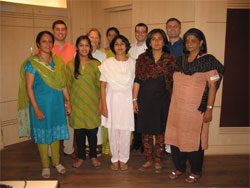Developing Young Leaders in India
Teachers College has received a $750,000 grant from The Global Education and Leadership Foundation (tGELF) to help develop and assess a leadership curriculum for junior high and high school students at a group of schools in
The joint initiative was officially launched at the end of April at a ceremony in
The leadership program – one of the few that exists at the high school level – focuses on identifying young people with leadership potential and developing their attitudes, skills, values, knowledge and leadership styles during the course of secondary school. Participants in the program are winnowed down during their junior and senior high school years, with just one percent ultimately being selected as tGELF Leadership Scholars. The Scholars receive tuition to any college or university in the world, and are free to pursue careers in any field they choose.
“I am particularly pleased that Teachers College is part of this wonderful collaboration with the Global Education and Leadership Foundation and with the many schools, principals and teachers that are working to build
tGELF officials said that with
Currently 25 schools in
The program, which consists of 12 sessions over the course of a school year, is mandatory for all eighth and ninth grade children at participating schools. Students work on team skills, thinking skills and writing, speaking and listening skills; engage in role-play and exercises that involve moral decision making; learn to identify their own leadership strengths and weaknesses; and discuss the qualities of national and global leaders. They also participate in conflict management workshops, an adventure camp and organic farming, and spend time with street children.
“This is not an instance of Teachers College coming in and telling Indian educators what to do,” said William Gaudelli, Associate Professor of Social Studies and Education, Teachers College. “It’s really a conversation and a collaboration toward common goals. tGELF already created a great basis for the curriculum. We’re giving them a menu of options for improving their fine work while supporting its implementation on the ground.”
There are two teacher training workshops per year, run by Teachers College faculty.
Teachers College will officially work on the project for two years, but the work has been ongoing since December 2007, when the first group of faculty members from the College visited three Indian schools, and is likely to extend beyond the two-year mark in the form of an ongoing consultancy.
The faculty members from the College who are working on the tGELF leadership curriculum are Drs. Gaudelli, Margaret Crocco and Anand Marri, all of the Department of Social Studies and Education, who are providing the curricular expertise and helping to train Indian teachers in the use of the materials, and Dr. Madhabi Chatterji, Associate Professor of Measurement and Evaluation in the Department of Organization and Leadership, who is helping to create a system to assess students and the program itself. Six TC doctoral students – Nancy Koh, Radhika Iyengar, Ellen Livingston, David Goldberg and Dennis Urban – also are working on the project.
The project’s advisory board is composed of academic experts from both
To learn more about the Khemka Foundation visit http://www.khemkafoundation.org/
Published Monday, Apr. 28, 2008
